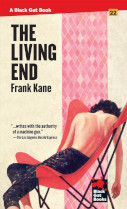
Set in the 1950s, The Living End explores the rise of disk jockeys and a music industry corrupt to its core. Eddie Marlon weasels his way onto a radio station and then launches a series of marketing coups that produce big ratings, plenty of advertisers, and money for the radio station. But Marlon doesn’t stop there. He targets teenagers and gears the music on his radio shows to their tastes. Marlon’s next strategy is to coerce performers to deliver their services for free at events and in return, Marlon would play their records. Later, Marlon schemes with a music publishing company to get a percentage of the sheet music and royalties on records. The Living End exposes the payola practices of the 1950s and 1960s when deals were made and stars were born amid a blizzard of dirty money.
Frank Kane, most famous for his Johnny Liddell private eye novels, captures the excitement of the rise of Rock & Roll radio with all its luridness and corruption. If you’re looking for a gritty novel set in the steamy radio industry of the Fifties, The Living End will fog up your glasses! GRADE: A
Not a big fan of Kane’s PI novels but the subject matter of this one sounds more up my alley.
Jeff, you would enjoy the machinations of the music industry back in the 1950s. Kane lays it all out.
This sounds interesting. Don’t think I have ever read a book about the music industry except in music bios.
Patti, there was a lot of corruption in the music industry just as teenage radio programs started generating plenty of money for the mob. Frank Kane adds plenty of detail to the novel.
I keep getting Frank Kane confused with Henry Kane. Even their book covers look similar.
Dan, you’re right. In the Frank Kane vs. Henry Kane competition I’ll pick Henry Kane. He was the better writer and knew how to generate suspense at a higher level. But bother Kanes are worth reading.
I read a couple of the Johnny Liddell novels some time ago and don’t recall being terribly impressed with them. In the last year or so Black Gat Books published another novel about the music industry in the Fifties, “Angel’s Flight” by Lou Cameron that got a lot of rave reviews, and I didn’t much like that one either. This seems like such a fruitful subject for a novel that you’d think somebody would have done it justice.
Michael, I got the sense while reading THE LIVING END that Frank Kane had some acquaintance with the payola racket of the 1950s. What he describes rings true to me.
You don’t mention any crime of violence in this. Sure, Paylola was illegal, but not enough to keep a crime novel going all by itself. Also, Paylola was mostly all in the big cities in the Eastern US. This one wouldn’t keep me reading.
Rick, the payola was just the tip of the iceberg. The mob controlled juke boxes all over the country and which songs made it into the machine depended on money, money, money.
Where’s the murder?
Rick, there’s a near-murder of a female singer when she’s whipped by a network president. THE LIVING END is more concerned with corruption and criminal conspiracy.
Back in 2012, Josef Hoffman wrote a piece titled Music and Crime: 50 Novels that you and Patti might find worthwhile to track down. I copied it at the time, but don’t know the source. No Frank Kane, but one Henry. My favouirte crime and music series are Ace Atkins’ featuring a blues historian and Bill Moody’s jazz pianist.
Kent, thanks for the heads up on “MUSIC AND CRIME: 50 NOVELS.” I found it and here’s the link: http://mysteryfile.com/blog/?p=17669